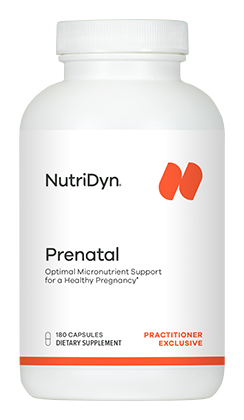| Ingredient | Amount | Daily Value |
|---|---|---|
| Vitamin A (80% as mixed carotenoids and 20% as retinyl palmitate) | 1,500 mcg RAE | 115% |
| Vitamin C (as ascorbic acid and niacinamide ascorbate) | 500 mg | 417% |
| Vitamin D3 (as cholecalciferol) | 50 mcg | 333% |
| Vitamin E (as d-alpha tocopheryl succinate) | 82 mg | 432% |
| Vitamin K (as phytonadione) | 100 mcg | 111% |
| Thiamin (as thiamin mononitrate) | 5 mg | 357% |
| Riboflavin | 5 mg | 313% |
| Niacin (as niacinamide ascorbate) | 25 mg NE | 139% |
| Vitamin B6 (as pyridoxal-5’-phosphate and pyridoxine HCl) | 20 mg | 1,000% |
| Folate (as calcium L-5-methyltetrahydrofolate) (BioFolate®) | 1,700 mcg DFE | 283% |
| Vitamin B12 (as methylcobalamin) | 125 mcg | 4,464% |
| Biotin | 300 mcg | 857% |
| Pantothenic Acid (as calcium-D-pantothenate) | 25 mg | 357% |
| Choline (as choline bitartrate) | 175 mg | 32% |
| Calcium (as calcium citrate) | 400 mg | 31% |
| Iron (as ferrous bisglycinate chelate) (Ferrochel™) | 30 mg | 111% |
| Iodine (as potassium iodide) | 200 mcg | 69% |
| Magnesium (as magnesium oxide) | 300 mg | 75% |
| Zinc (as zinc bisglycinate chelate) (TRAACS™) | 20 mg | 154% |
| Selenium (as selenium chelate) | 200 mcg | 286% |
| Copper (as copper citrate) | 2 mg | 154% |
| Manganese (as manganese citrate) | 1.2 mg | 46% |
| Chromium (as chromium nicotinate glycine chelate) (TRAACS™) | 150 mcg | 333% |
| Molybdenum (as molybdenum amino acid chelate) | 50 mcg | 100% |
| 2'-Fucosyllactose (2'-FL) | 200 mg | ** |
| Inositol | 50 mg | ** |
| * Percent Daily Values (DV) are based on a 2,000 calorie diet. | ||
| ** Daily Value (DV) not established. |
Prenatal
Prenatal
Prenatal is a specially formulated high quality vitamin and mineral supplement designed to support healthy fetal development by providing essential nutrients during pregnancy.◆
Pregnancy represents a time of great physiological change in a woman’s body. Nutritional requirements change too. Vitamin and mineral needs increase substantially in order to develop and grow a healthy fetus. A high quality vitamin and mineral supplement such as Prenatal can help a mother-to-be sustain her own health during pregnancy and minimize certain risks during the growth and development of the fetus and later in life.◆
The benefits of prenatal supplementation may include:
● Support overall health and well-being during preconception, pregnancy, and nursing◆
● Support overall health and well-being for fetal development and the baby◆
● Promote a healthy gut microbiota◆
● Support balanced mood◆
Excess vitamin A intake may be toxic and may increase the risk of birth defects. Pregnant women or women who may become pregnant should not exceed 3,000 mcg RAE (10,000 IU) of preformed vitamin A (retinyl palmitate) per day.







